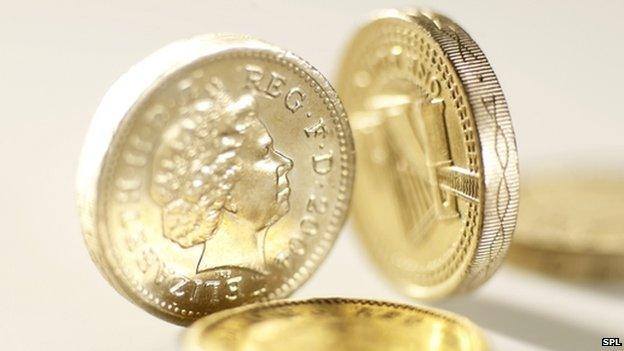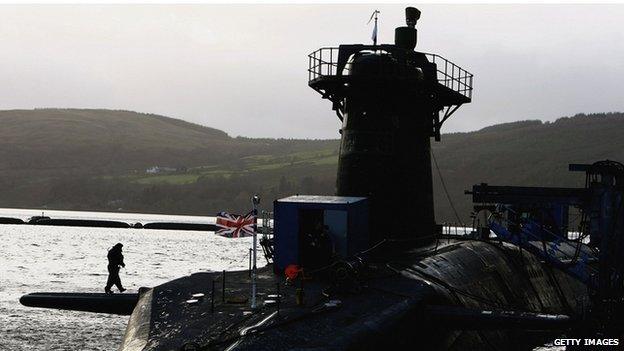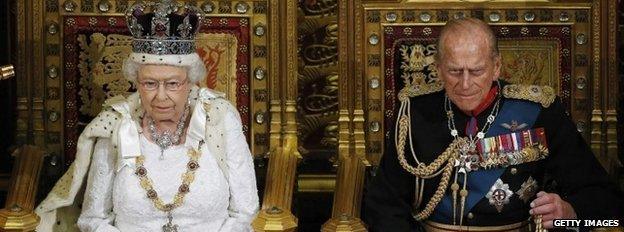Scottish independence: Scots and English 'willing to share institutions'
- Published

The survey indicated a willingness to share the pound in the event of a "Yes" vote
People across the UK appear willing to continue sharing institutions after Scottish independence, according to the annual British Social Attitudes survey.
The survey indicated almost 70% of people in England and Wales believe an independent Scotland should be allowed to share the pound.
And more Scots think Trident nuclear missiles should stay in the country than think they should leave.
The majority of Scots also wanted to keep the monarchy and the BBC.
According to the survey, which was carried out last year, 38% of those questioned in England and Wales said if Scotland left the UK it should "definitely be allowed" to continue to use sterling, while 31% believe it should "probably be allowed" to do so.
In Scotland, 79% believed the country should continue to use the pound in the event of a "Yes" vote in September's referendum, while 11% said it should have its own currency and 7% favoured the euro.
The research also found 28% of people in Scotland said that, while they want to be able to use the pound if the country is independent, they "anticipated that in practice this would not be possible".
In February, Chancellor George Osborne ruled out a currency union between an independent Scotland and the rest of the UK, a position backed by Labour shadow chancellor Ed Balls and the Lib Dem Chief Secretary to the Treasury, Danny Alexander.
A currency union with the rest of the UK is the preferred option of the Scottish government, which has accused its Westminster counterparts of "bluff and bluster" over the issue.
Nuclear submarines
Elsewhere, the survey suggested 41% of people in Scotland believed Trident nuclear submarines should continue to be based at Faslane on the Clyde after independence, while 37% said they should not.

A majority of voters in England and Wales thought nuclear submarines would have to leave an independent Scotland
In England and Wales, just over a quarter (26%) of people agreed that Britain's nuclear weapons should continue to be based in Scotland if it becomes an independent country, while 63% said they should either "definitely" or "probably" be moved elsewhere.
The Scottish government has pledged to remove all nuclear weapons from Scotland after independence.
The research was carried out by NatCen, which said "people in Scotland are not necessarily convinced that becoming independent should require the removal of British nuclear weapons".
Its research also suggested 62% of people in Scotland think an independent Scotland should keep the same King or Queen as England, while 65% in England and Wales agree.
And 86% of people in Scotland would like to be able to carry on watching the BBC after independence, while 82% of those in England and Wales think they definitely or probably should be allowed to do so.

Analysis: Prof John Curtice, NatCen Social Research

On the BBC: The vast majority of people in Scotland want to keep the BBC and the vast majority of people in England and Wales are happy for Scotland to keep the BBC in the event of independence.
On the queen: They're not quite so equally agreed about the monarchy - around two thirds of people in Scotland want to keep the queen, and two thirds of people in England and Wales are happy for them to keep the queen.
On sharing the pound: We were doing this research in the summer of 2013, before the currency intervention and the whole issue blew up. At that point, 70% of people in England and Wales suggested, if Scotland wants to share the pound, "that's fine by us".
We know from subsequent opinion polls the position changed after George Osborne said he didn't think it was a terribly good idea, but that does suggest - rather than as was argued by those on the "No" side that there's no prospect of the public in England and Wales being willing to tolerate this idea - their opposition is in fact the consequence of politicians on the "No" side telling them it isn't a very good idea.
On Trident: It is true that Scotland is a bit more opposed to nuclear weapons than England.
That said, when we asked people in Scotland, "do you think that the United Kingdom should be required to remove its weapons in an independent Scotland," actually slightly more people said "No" than "Yes".
The pressure in the event of a "Yes" vote so far as public opinion's concerned for getting those Trident weapons out of Scotland will in fact be much stronger south of the border, where the reaction seems to be, "if Scotland decides to be independent, then we better move them back into England and Wales", so, ironically, the SNP's position gets more support from public opinion in England and Wales than it does north of the border.
On more devolved powers: Aroundhalf of people in England and Wales are willing to support the idea of more devolution, and only a quarter are really opposed - although when we come to some of the detail, public opinion on both sides of the border is more complicated.
Scotland's pretty equivocal about the idea of the basic rate of income tax being different on the two sides of the border. England and Wales don't think it's a terribly good idea - so they're willing to back the principle, but when it comes to practice, it's much more difficult.
On dual citizenship: On both sides of the border, there's a reluctance to accept the idea that British citizens living in Scotland could claim their Scottish citizenship, but also hang on to their British citizenship.
Only half in Scotland think people should be able to have both a British and a Scottish passport, and, south of the border, only one in three do so.
That's a position where both governments could meet greater public resistance than either side anticipated.

But while about half of Scots (47%) think they should be able to claim both a British and a Scottish passport should Scotland become independent, only one in three people in England and Wales think they should be able to do so.
More powers
If the referendum results in a "No" vote, 45% of people in England and Wales would support Scotland having more power and responsibility over taxation and welfare, with 27% opposed and 23% neither in favour nor against such a move.
The report stated: "Public opinion in the rest of the UK would not necessarily be enthusiastic about more Scottish devolution, but would probably be willing to tolerate it,"
Prof John Curtice, of NatCen Social Research, said: "If Scotland does vote to leave the United Kingdom, Scotland and England will have to find ways of getting along with each other.
"In some instances, such as the monarchy and the BBC, there appears to be a willingness on both sides of the border to share institutions.
"Even on the issue on which the Scottish and UK governments have been most obviously at loggerheads - on the prospect of an independent Scotland sharing the pound - public opinion in England and Wales may not necessarily be as hostile to the idea as has sometimes been suggested.
"However, those living in the rest of the UK might want Trident moved out of Scotland, irrespective of whether a future Scottish government is willing to keep the nuclear weapons facility on its shores or not."
Responding the survey's findings on the currency of an independent Scotland, a Treasury spokesman said: "The position on currency union is clear. The Chancellor, Chief Secretary and shadow chancellor have all said there will not be one with a separate Scotland.
"The only way to keep the pound is to stay together in the UK.
"Public opinion has shifted, and shifted significantly. When it comes to a currency union, the people don't want it, business rejects it and parliament would never pass it."
A Scottish government spokeswoman said: "We believe nuclear weapons have no place in Scotland, and have made clear our intention to negotiate for the removal of Trident within the first parliamentary term of an independent Scotland."
She added: "As we have outlined, an independent Scotland will keep the pound, and a formal currency union will be in the overwhelming economic interests of the rest of the UK."